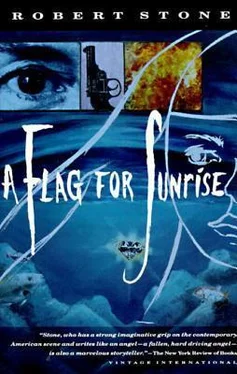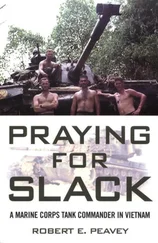Robert Stone - A Flag for Sunrise
Здесь есть возможность читать онлайн «Robert Stone - A Flag for Sunrise» весь текст электронной книги совершенно бесплатно (целиком полную версию без сокращений). В некоторых случаях можно слушать аудио, скачать через торрент в формате fb2 и присутствует краткое содержание. Год выпуска: 2012, Издательство: Vintage, Жанр: Современная проза, на английском языке. Описание произведения, (предисловие) а так же отзывы посетителей доступны на портале библиотеки ЛибКат.
- Название:A Flag for Sunrise
- Автор:
- Издательство:Vintage
- Жанр:
- Год:2012
- ISBN:нет данных
- Рейтинг книги:4 / 5. Голосов: 1
-
Избранное:Добавить в избранное
- Отзывы:
-
Ваша оценка:
- 80
- 1
- 2
- 3
- 4
- 5
A Flag for Sunrise: краткое содержание, описание и аннотация
Предлагаем к чтению аннотацию, описание, краткое содержание или предисловие (зависит от того, что написал сам автор книги «A Flag for Sunrise»). Если вы не нашли необходимую информацию о книге — напишите в комментариях, мы постараемся отыскать её.
A Flag for Sunrise — читать онлайн бесплатно полную книгу (весь текст) целиком
Ниже представлен текст книги, разбитый по страницам. Система сохранения места последней прочитанной страницы, позволяет с удобством читать онлайн бесплатно книгу «A Flag for Sunrise», без необходимости каждый раз заново искать на чём Вы остановились. Поставьте закладку, и сможете в любой момент перейти на страницу, на которой закончили чтение.
Интервал:
Закладка:
“Why don’t you just write them a letter. Ask them what it is they want down there.”
Nolan exhaled slowly and let his narrow shoulders sag.
“Give me a brandy,” he told the waiter. “Two brandies.” He turned from Holliwell to look around the room, at the wainscoted ceilings and the dwindling crowd of heavy-faced, hard-eyed diners.
“Jesus, I picked this place because I thought the atmosphere might discourage moral posturing.”
“It must be you and me, Marty. We’re spoiling the atmosphere.”
Nolan took his brandy without ceremony.
“This conversation depresses me,” he said, “because it reminds me that we live in the land of total vindication. T.V. T.V. or nothing. I mean twenty years ago we had the total vindication of William Jennings Bryan, and Father Flanagan and apple pie. Secularism”—he made a little equals sign in the air with his fingers—“was Communism. Modernism was godlessness. Bolshevism … All the eggheads were Commie stooges and you had to go to Fordham or Darlington, South Carolina, to find a loyal American. Then we get fucked up in Nam and Saigon falls and the whole card’s reversed. Hiss didn’t do it, the Rosenbergs didn’t do it, nobody fucking did it and Truman started the cold war. Total vindication.”
“Well,” Holliwell said, “there’s nothing like total vindication.”
“Exactly. See, it’s all a movie in this country and if you wait long enough you get your happy ending. Until somebody else’s movie starts. In many ways it’s a very stupid country.”
“Is this the patriotic approach?”
“Hell, no,” Nolan said, “the patriotic approach is out of date.”
They sat drinking in silence for a while. When the check came, Holliwell moved it to his own side of the table and kept it there.
“We’re at a very primitive stage of mankind,” Nolan declared, “that’s what people don’t understand. Just pick up the Times on any given day and you’ve got a catalogue of ape behavior. Strip away the slogans and excuses and verbiage, the so-called ideology, and you’re reading about what one pack of chimpanzees did to another.”
Holliwell paid the check with his BankAmericard and Nolan did not move to prevent him.
“Sorry,” Holliwell said. “Not this time.”
They walked to the front door together and stood beside the parking-lot fence. The brisk wind raised whirls of dust from the sidewalk and Nolan shielded his eyes with his right hand.
“When you’re down there you may feel differently. So if I may, I’ll ask you again through a third party.”
Holliwell only smiled and they shook hands. It was not until he was halfway across the Brooklyn Bridge that the suggestion of a threat in Nolan’s final words struck him, making him think of the man entombed beside the Perfume River, the involved observer of the modern world. A chill touched his inward loneliness. He was, he knew at that moment, really without beliefs, without hope — either for himself or for the world. Almost without friends, certainly without allies. Alone.
He drove toward Manhattan facing the squat brutality of the new buildings that had gone up around the bridge; he was depressed and too drunk for safety. The drive uptown left him tired and anxious. Gratefully, he turned the Volvo keys over to the hotel doorman and once upstairs ordered a bottle of scotch from room service. When the drink arrived, he sat with his feet on the windowsill looking out over the midtown rooftops. On a day in May, he and Marty Nolan had once walked from the library on East Seventy-ninth Street all the way down Second Avenue to the bridge and then across it, ending up in a bar on Clark Street. It would have been about 1955. Hour after hour, block after block of talk.
After a while, he moved over to the double bed, propped a pillow up behind him and dialed his home number. When he heard his wife’s voice on the line, he lit a cigarette.
“So you’re O.K.,” he said. “You got back all right.”
“I told you not to worry. He had his medicine at the hospital. He was half zonked.”
“So he didn’t rave and carry on?”
“He slept. When we got to his house he didn’t know where he was.”
“Does he ever?”
“Sure. He’s very aware.”
“What were his parents like?”
“Very middle-class. Quite well off, fancy house. They asked me in but I didn’t go. They’ll drive him back.”
“So that’s that.”
“Yep,” she said.
“I had my lunch with Marty. We drank a lot.”
“You sound like you’ve been drinking. What are you going to do with yourself now?”
Holliwell poured himself a little scotch and ice water. In the blue sky beyond his window, fleecy January clouds were speeding over Manhattan.
“Maybe I’ll walk over to Eighth Avenue. For some twenty-dollar fellatio.”
“You’re kidding, aren’t you?”
“Yes,” he said. “Of course.”
“Well, I wish I was up there with you. And I wish I could go along.”
“Marty told me that Paul Robeson just died.”
“My God, was he gloating about it?”
“He was sort of gloating.”
“Listen,” she said. “Did he ask you to do any work for them?”
“He had something up his sleeve. I turned him down cold.”
“Did you let him know you were mad at him?”
“I wasn’t mad at him.”
“I think they have a hell of a lot of nerve,” she said.
“I love you,” Holliwell told her. “Take care.”
“I love you too. You take care too.”
He sat on the edge of the bed, drinking still more whiskey and thinking about his conversation with Nolan. Shortly he began to wonder what Marty had been writing in that hootch outside of Hue, what he had meant by the modern world and by being at home in it. And by “the Jew.”
A great deal of profoundly fractured cerebration had gone down in Vietnam. People had been by turns Fascist mystics, Communist revolutionaries and junkies; at certain times, certain people had managed to be all three at once. It was the nature of the time — the most specious lunacy had been conceived, written and enacted on both sides of the Pacific. Most of the survivors were themselves again, for what it was worth. No one could be held totally responsible for his utterances during that time.
The Jew was presumably the one who squatted on the estaminet, blistered in Brussels, patched and peeled in Antwerp. Holliwell knew him; his name was Sy, he had once run a newspaper stand on the corner of Dyckman Street and Broadway. Sy had lived almost across the hall from Holliwell and his mother in a cheap hotel in Washington Heights for ten years and Holliwell still half suspected that Sy had been his mother’s lover. He had never asked.
For years, he had worked for Sy at the paper stand and they had conducted a running discourse on the state of the world at mid-century. Holliwell had learned the words of the “Internationale” from Sy but whenever Holliwell mentioned church or churchly things Sy would smile with lupine contempt.
“They pound that shit into your head. At that school you go to.”
Sy was a Communist, he had been an organizer in the merchant marine during the war. Holliwell had found Sy’s being a Communist appalling. He would bait Sy with the Hitler-Stalin pact, the Katyn massacre, forced-labor camps, the NKVD.
When the trucks brought bound stacked papers to the curb, Sy would cut the twine from them with a sharpened knuckle-duster, baring his teeth at the red banner of Hearst’s Journal-American.
“That school — they pound that shit into your head.”
They would stand hunched over the stacks, in ink-stained aprons full of sweaty change, their backs to the ice-cold sour wind from the Bronx breweries.
Читать дальшеИнтервал:
Закладка:
Похожие книги на «A Flag for Sunrise»
Представляем Вашему вниманию похожие книги на «A Flag for Sunrise» списком для выбора. Мы отобрали схожую по названию и смыслу литературу в надежде предоставить читателям больше вариантов отыскать новые, интересные, ещё непрочитанные произведения.
Обсуждение, отзывы о книге «A Flag for Sunrise» и просто собственные мнения читателей. Оставьте ваши комментарии, напишите, что Вы думаете о произведении, его смысле или главных героях. Укажите что конкретно понравилось, а что нет, и почему Вы так считаете.












